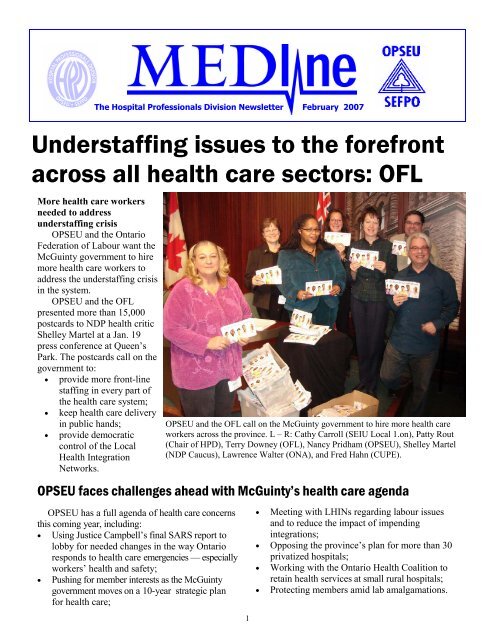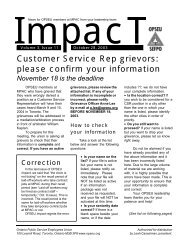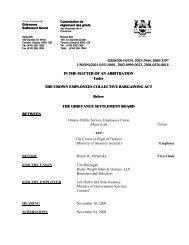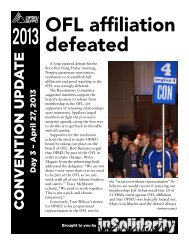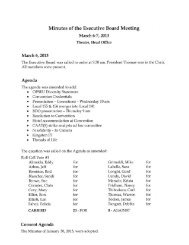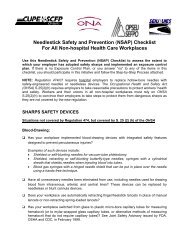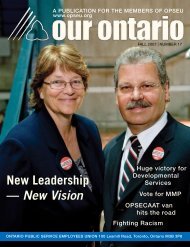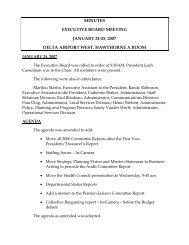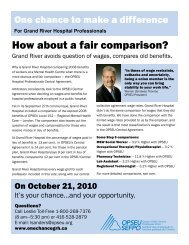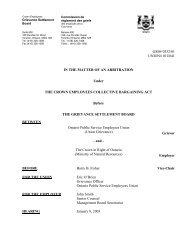The Hospital Professionals Division Newsletter February ... - OPSEU
The Hospital Professionals Division Newsletter February ... - OPSEU
The Hospital Professionals Division Newsletter February ... - OPSEU
You also want an ePaper? Increase the reach of your titles
YUMPU automatically turns print PDFs into web optimized ePapers that Google loves.
<strong>The</strong> <strong>Hospital</strong> <strong>Professionals</strong> <strong>Division</strong> <strong>Newsletter</strong> <strong>February</strong> 2007<br />
Understaffing issues to the forefront<br />
across all health care sectors: OFL<br />
More health care workers<br />
needed to address<br />
understaffing crisis<br />
<strong>OPSEU</strong> and the Ontario<br />
Federation of Labour want the<br />
McGuinty government to hire<br />
more health care workers to<br />
address the understaffing crisis<br />
in the system.<br />
<strong>OPSEU</strong> and the OFL<br />
presented more than 15,000<br />
postcards to NDP health critic<br />
Shelley Martel at a Jan. 19<br />
press conference at Queen’s<br />
Park. <strong>The</strong> postcards call on the<br />
government to:<br />
• provide more front-line<br />
staffing in every part of<br />
the health care system;<br />
• keep health care delivery<br />
in public hands;<br />
• provide democratic<br />
control of the Local<br />
Health Integration<br />
Networks.<br />
<strong>OPSEU</strong> has a full agenda of health care concerns<br />
this coming year, including:<br />
• Using Justice Campbell’s final SARS report to<br />
lobby for needed changes in the way Ontario<br />
responds to health care emergencies — especially<br />
workers’ health and safety;<br />
• Pushing for member interests as the McGuinty<br />
government moves on a 10-year strategic plan<br />
for health care;<br />
<strong>OPSEU</strong> and the OFL call on the McGuinty government to hire more health care<br />
workers across the province. L – R: Cathy Carroll (SEIU Local 1.on), Patty Rout<br />
(Chair of HPD), Terry Downey (OFL), Nancy Pridham (<strong>OPSEU</strong>), Shelley Martel<br />
(NDP Caucus), Lawrence Walter (ONA), and Fred Hahn (CUPE).<br />
<strong>OPSEU</strong> faces challenges ahead with McGuinty’s health care agenda<br />
1<br />
• Meeting with LHINs regarding labour issues<br />
and to reduce the impact of impending<br />
integrations;<br />
• Opposing the province’s plan for more than 30<br />
privatized hospitals;<br />
• Working with the Ontario Health Coalition to<br />
retain health services at small rural hospitals;<br />
• Protecting members amid lab amalgamations.
You can now work after age<br />
65 — if you wish<br />
By Patty Rout<br />
Bill 211 is an amendment to the Human Rights<br />
Code and became law Dec. 12 , 2006.<br />
For unionized workers with a collective<br />
agreement, the rules apply as well. All collective<br />
agreements must comply with the law.<br />
Things you should consider when planning to<br />
work past 65:<br />
• Members can continue working and<br />
contributing to their HOOPP plan until they are 69.<br />
<strong>The</strong>re is no cap to the number of years you can<br />
accumulate but in your 70 th year you must start<br />
collecting your pension plan. It does not mean you<br />
cannot work, but the maximum you can accrue<br />
credits for is age 69, the same as CPP. Some<br />
people terminate, start their pension, then return to<br />
work. <strong>The</strong> legislation does not allow a member to<br />
collect a pension and then contribute and build<br />
credit in the same pension plan at the same time.<br />
If the collective agreement required<br />
participation in the pension plan, the employer<br />
would deduct the HOOPP contributions as per<br />
the collective agreement and then HOOPP<br />
would refund the amount at the end of the year.<br />
• WSIB entitlements have not changed.<br />
Workers who are injured after their 63rd<br />
birthday will be entitled to receive up to two<br />
years of Loss of Earnings Benefits. Employers<br />
are also not obligated to bring back injured<br />
workers age 65 or older after they recover from<br />
a workplace injury.<br />
• CPP, Old Age Security, and Guaranteed Income<br />
Supplement are federal programs and unaffected<br />
by the age change.<br />
• Employment Insurance is not affected. You<br />
continue to pay premiums if you work past 65 and<br />
are eligible to collect unemployment, sickness,<br />
parental or compassionate leave benefits.<br />
• Individuals 65 and over could be eligible for<br />
government benefits such as Ontario Drug Benefit<br />
Plan. Not all drugs are covered by this plan. If you<br />
are a senior single making more than $16,018 a<br />
2<br />
year or if you are a senior couple with a combined<br />
income of more then $24,175 a year you will pay<br />
your first $100 deductible in prescription costs<br />
yearly. After that you pay a $6.11 ODB dispensing<br />
fee for each prescription filled within the year.<br />
• <strong>The</strong> province covers the full cost of annual eye<br />
exams for those over 65. You would be able to<br />
apply other eligible eye costs to your workplace<br />
plan.<br />
• Seniors now receive physiotherapy at no cost<br />
through hospitals, long-term care, home care and<br />
CCACs. Workers covered by the central language<br />
can still pay a physiotherapist of their choice and<br />
their benefit plan will pay up to $300 dollars per<br />
year.<br />
• Hearing aids are partially covered by the<br />
Assistive Devices Program (ADP) and the balance<br />
(for workers covered by the central language) can be<br />
submitted to the workplace<br />
benefit plan.<br />
• Long-term disability<br />
coverage ends at age 65.<br />
Life insurance ends at age<br />
65 unless you have<br />
negotiated something<br />
different. Members should<br />
have the ability to transfer<br />
from the group plan to an<br />
individual plan before age<br />
65.<br />
• <strong>The</strong> <strong>OPSEU</strong> Central HPD agreement negotiated<br />
benefits to age 69 this last round. With our<br />
workloads it is not likely many of us will choose to<br />
work past 65, but now it will be our decision!<br />
For more information visit<br />
www.ontario.ca/mandatoryretirement<br />
www.nupge,ca<br />
An employer can<br />
no longer force<br />
you to retire at<br />
65, except for<br />
bona fide<br />
occupational<br />
reasons.
SARS final report: <strong>Hospital</strong>s dangerous as<br />
mines or factories<br />
<strong>OPSEU</strong> President Leah Casselman welcomed<br />
Justice Archie Campbell’s final report on Severe<br />
Acute Respiratory Syndrome (SARS) which<br />
recognized that hospitals and other health care<br />
workplaces are as dangerous as mines or factories.<br />
Casselman said the SARS report accurately<br />
reflected the concerns of <strong>OPSEU</strong> members who were<br />
among the more than 600 health care workers<br />
interviewed by Campbell.<br />
“Justice Campbell listened. <strong>The</strong> report reflects<br />
our concerns. We welcome the recommendations and<br />
request the McGuinty government immediately take<br />
action,” Casselman said.<br />
Specifically, <strong>OPSEU</strong> praised the report’s<br />
recommendations that:<br />
<strong>The</strong> precautionary principle (the principle that<br />
health workers should err on the side of caution, in<br />
the absence of scientific evidence) should be<br />
enshrined in the Occupational Health and Safety Act<br />
and other relevant legislation.<br />
Building a safety culture is critical to making<br />
hospitals safer places. More funding, training and a<br />
change of approach are needed.<br />
Optimal staffing levels for teams of occupational<br />
health and safety experts are needed.<br />
Communications failures between government<br />
and hospitals; and hospitals and workers, must be<br />
addressed.<br />
“Workers have to stay healthy to do their<br />
jobs and protect the public. Worker health and<br />
safety is just as important in a health care<br />
workplace as in any other workplace, and this<br />
report recognizes this,” Casselman said.<br />
“Only the dedication of our health care<br />
workers protected Ontarians from a much more<br />
terrible SARS epidemic,” Casselman said. “This<br />
report validates the need for health care workers<br />
to be protected on the job so they can do the job<br />
of protecting the public. <strong>OPSEU</strong> pledges to help<br />
implement the report and challenges the<br />
government to do likewise.”<br />
<strong>OPSEU</strong>, CUPE, ONA and SEIU sent a joint<br />
letter to Premier McGuinty Jan. 22 asking the<br />
Premier to implement the SARS report<br />
recommendations immediately. See<br />
www.opseu.org for the full text.<br />
For the report, see:<br />
www.sarscommission.ca/report/index.html<br />
<strong>Hospital</strong> privatization: scope narrowed but P3s still a threat<br />
By Patty Rout<br />
Ontario Deputy Minister of Health Ron Sapsford<br />
has told hospitals the Ministry has adopted a new<br />
policy for public private partnerships.<br />
Aside from financing new buildings, the P3<br />
hospitals will now be limited to “hard facility<br />
management and life cycle maintenance.”<br />
This includes the management of the physical<br />
plant, information technology backbone, coordination<br />
of medical equipment procurement and<br />
non-patient food services.<br />
Private-public partnerships are not to include<br />
housekeeping, patient food services, portering,<br />
laundry, linen, material management, medical<br />
equipment maintenance, diagnostic services, hospital<br />
management, pharmacies and clinical care.<br />
This will apply to projects already at market<br />
in places like North Bay, Sault Ste. Marie and<br />
Niagara.<br />
It is apparent from the announcement that<br />
some P3 services will still be privatized. But the<br />
scope of privatization has been narrowed. So let’s<br />
keep the heat on P3’s!<br />
3
<strong>The</strong> shortage crisis in lab is now!<br />
<strong>The</strong>re is a plan for more nurses and doctors, but<br />
little plan for other healthcare workers.<br />
A chronic shortage of workers and a cascade of<br />
retirements mean huge numbers of vacant<br />
positions. One hospital said it took more than a<br />
year to fill a vacant position; there is no one out<br />
there!<br />
<strong>The</strong> focus on good jobs, full time jobs, and<br />
decent working conditions has helped recruit nurses<br />
and doctors. But our hospitals are now canceling<br />
shifts for weeks on end because there are no lab<br />
technologists to hire.<br />
Double shifts<br />
<strong>Hospital</strong>s are asking lab techs to cover double<br />
shifts for days in a row to<br />
maintain service. In order<br />
for medical laboratories<br />
to respond to the<br />
emerging health diseases<br />
we need to address the<br />
shortages of lab techs<br />
now. It is past time to<br />
look at the shortages of<br />
other health care workers.<br />
Today, we focus on the<br />
largest shortage in<br />
healthcare, the medical<br />
laboratory technologist.<br />
• To solve this problem,<br />
we need to improve the<br />
work environment and job<br />
satisfaction by investing in<br />
Chair’s Report<br />
Patty Rout, HPD Chair<br />
full-time jobs and stopping the heavy reliance on<br />
part-time and casual workers.<br />
• During the SARS crisis, workers were<br />
employed at multiple work sites. Many reports<br />
have recommended against this, but because of<br />
shortages it is now being encouraged more than<br />
ever. Amalgamated hospitals are forcing workers to<br />
travel 30 - 40 km to three or four worksites to do<br />
their job. Travel costs are not reimbursed. This is<br />
unacceptable!<br />
• We need safer workplaces to encourage<br />
workers to come into our professions. We need<br />
safety-engineered sharps legislation. Ergonomic<br />
issues also need to be addressed.<br />
• We need to enable healthcare workers to fully<br />
use the scope of<br />
practice they are<br />
educated for, and<br />
improve career<br />
opportunities in<br />
our professions.<br />
We need to<br />
increase course<br />
enrollments,<br />
reduce tuition<br />
“Politically, long<br />
wait times are seen<br />
as the disease, when<br />
they are just the<br />
symptom.”<br />
costs and train aggressively wherever the shortages<br />
exist. A government-sponsored Health Council<br />
Summit in 2005 identified Ontario as needing four<br />
new professions: physician assistant, nurse<br />
endoscopist, surgical first assistant and clinical<br />
specialist radiation therapist. In Ontario we also had<br />
new recommendations from HPRAC: a pharmacy<br />
technician college under pharmacists, a new college<br />
for naturopaths and homeopaths, a college for<br />
kiniseologists and a college for psychotherapists.<br />
<strong>The</strong> National Health Council has connected<br />
shortages of medical laboratory technologists with<br />
longer wait times.<br />
Technologists: third-largest profession in health<br />
care<br />
<strong>The</strong>re are more than 20,000 med lab techs in Canada.<br />
It is the third largest health care profession.<br />
• More than 36 per cent of technologists are in<br />
Ontario. About 80 per cent are female and the<br />
average age is 42.<br />
• <strong>The</strong>re are 57 lab techs per 100,000 in Ontario as<br />
compared with 99 per 100,000 in Saskatchewan.<br />
A shortage of workers is the number one issue for<br />
our members and it must be addressed by our<br />
governments now.<br />
4
HPD Year in Review<br />
In January 2006, representatives from our<br />
<strong>OPSEU</strong> health sectors made history as we came<br />
together with representatives from SEIU, CUPE<br />
and ONA to begin development of a plan to work<br />
together around organizing, pension, negotiations<br />
and communication. This was the first time the four<br />
main health care unions had worked together. We<br />
are still working together around<br />
LHINs and other issues.<br />
In <strong>February</strong> we set<br />
bargaining priorities, consisting<br />
of Yves Shank- chair, Leslie<br />
Sanders- vice chair, Bryan<br />
Mitchell, Sandy Blancher,<br />
Connie Ferrara, Boris Prus,<br />
Stephen Wallis, Moya Beall –<br />
negotiator and Michelle Haber<br />
and Gwen Jenkins in research.<br />
With our red scarves<br />
wrapped warmly around us, on a<br />
cold <strong>February</strong> day, we then<br />
rallied around Health Minister<br />
George Smitherman’s office to tell him how we felt<br />
about the lack of input and the need for a LHIN<br />
human resource plan.<br />
Well, Smitherman decided to ignore us when<br />
the legislation appeared in April. No one was<br />
happy. <strong>The</strong> lobby began again.<br />
In June, HPD members rallied at Queen’s Park<br />
with workers from across the province. Our<br />
members told the McGuinty government “hands off<br />
our health system. We want a publicly funded and<br />
publicly delivered system. Stop the privatization!”<br />
Our central bargaining team then shocked us all<br />
by negotiating a contract! <strong>The</strong> contract was ratified<br />
by 95 per cent of the membership. We hope it<br />
brought some stability to the sector and time to see<br />
how the new language actually works. Local<br />
bargaining continues with arbitration in late March<br />
2007.<br />
In June, the OHA and five health care unions<br />
agreed to request a meeting with Ron Sapsford, the<br />
deputy minister of health, around a human resource<br />
plan. We have had two meetings with Sapsford.<br />
Through this plan we hope to define the way<br />
workers move from one health sector to another,<br />
much like the agreements in the late 90s did on<br />
amalgamations. <strong>The</strong> language will be built around<br />
the PRSLTA, Bill 36, announced earlier in the<br />
year.<br />
Survey<br />
In the summer, we surveyed members about<br />
what they would like to see at the BPS conference<br />
in June 2007. Contract enforcement issues were<br />
by far the top issue for members.<br />
With help from <strong>OPSEU</strong> Executive Board<br />
Members, HPD leadership courses were held on<br />
accommodation issues.<br />
Regions 2, 6 and 7 will<br />
have courses in 2007.<br />
In Sept. 2006, the<br />
OHA/<strong>OPSEU</strong> central<br />
Joint Health and Safety<br />
meetings brought about<br />
some planned<br />
recommendations for<br />
ultrasound techs. Your<br />
<strong>OPSEU</strong> team members<br />
were Brendan Kilcline,<br />
Joan Murray and <strong>OPSEU</strong><br />
health and safety officer<br />
HPD rally at George Smitherman’s office in Feb. 2006<br />
Lisa McCaskell. <strong>The</strong> new<br />
public health and protections act was also<br />
introduced.<br />
In October, we met with Josh Tepperman,<br />
assistant to Rob Sapsford, to discuss shortages of<br />
allied health professionals.<br />
Many of us attended the Health Coalition<br />
conference in Toronto. Members asked questions<br />
of NDP Health Critic Shelley Martel and George<br />
Smitherman about their plans for the health<br />
system.<br />
Also in October, pay equity meetings began<br />
(see story, page 7). We plan to have this<br />
completed before the end of 2008, before the next<br />
round of bargaining begins. Our next meeting is<br />
Feb. 9 in Toronto.<br />
In November, NDP MPP Shelley Martel<br />
brought the safe sharps legislation to second<br />
reading (see story, page 6).<br />
Many members attended an excellent course<br />
on fiscal advisory committees put on by the OFL<br />
with support from the <strong>OPSEU</strong> board. This<br />
valuable course was planned in part by Pat<br />
McNamara, Pat Collyer and Rick Janson. New<br />
bills have been introduced on successor rights,<br />
long term care, pandemic planning and more.<br />
5
Is the sick-note sick<br />
By Brendan Kilcline, health and safety chair<br />
Increasingly <strong>OPSEU</strong> locals must deal with more<br />
aggressive “attendance management policies” and<br />
programs imposed by employers designed to reduce<br />
the use of sick leave provisions of the collective<br />
agreement. <strong>The</strong>y do not do this by improving<br />
working conditions, reducing workload and stress or<br />
preventing injury and illness, but by intimidating<br />
workers into coming into work sick.<br />
Often the employer demands sickness<br />
certification from the employee for all further<br />
incidents. Apart from inconveniencing the employee<br />
and encouraging them to come to work sick, this<br />
serves no legitimate function for the employer,<br />
employee, or society at large.<br />
Most physicians would agree a sick-note for a<br />
short-term, minor, self-limiting illness or injury<br />
serves no medically<br />
useful purpose.<br />
Physicians are often<br />
asked to offer a<br />
retrospective opinion<br />
on the employee’s<br />
health and safety<br />
medical capacity to<br />
perform job duties, the<br />
demands of which the<br />
physician is not in a<br />
position to fully assess.<br />
If the employee is forthright as to the purpose of<br />
the visit and the lack of medical urgency, the<br />
appointment is often a considerable time from the<br />
illness that required the visit. (Why displace a patient<br />
with more pressing needs) Furthermore if a<br />
physician can do little for you but fill in paperwork,<br />
they would prefer that you don't give their more<br />
seriously ill patients your cold in their waiting room!<br />
Demanding that employees produce the dubious<br />
document has many negative consequences. It<br />
encourages the sick worker to come into work<br />
and share their illness with their colleagues. <strong>The</strong><br />
employee often has to take time off work to obtain<br />
the certificate, thus increasing the burden on their coworkers<br />
who work short to cover the absence.<br />
<strong>The</strong> unnecessary office visits reduces the<br />
availability of physician services to patients that<br />
actually need them!<br />
Elsewhere the true cost of this abuse is being<br />
recognized. In the U.K. employers are forbidden<br />
from demanding physician notes for illnesses of<br />
less than seven days. Employees self-certify for<br />
such events.<br />
Canadian employers increasingly and<br />
inappropriately use the healthcare infrastructure as<br />
a component of attendance management policies.<br />
Reducing absenteeism due to illness can be better<br />
achieved by other more legitimate and supportive<br />
means.<br />
<strong>Hospital</strong>s complain that their emergency rooms<br />
are filled with patients that could be better treated<br />
elsewhere. <strong>The</strong>y should be a little more aware of<br />
the burden generated by such unreasonable<br />
requirements.<br />
Sharps bill passes second<br />
reading<br />
NDP MPP Shelley Martel’s Bill on safer<br />
sharps passed second reading in the Legislature<br />
Nov. 16, 2006. <strong>OPSEU</strong>, along with unions SEIU<br />
Patty Rout (<strong>OPSEU</strong>-HPD) with Linda Haslam-Stroud of<br />
ONA and Shelley Martel, MPP with 50 workers at the<br />
Legislature move the sharps legislation forward.<br />
and ONA, are pressing for Bill 30, Martel’s Private<br />
Member’s Bill that calls for the mandatory use of<br />
safety-engineered sharps, to be passed into law in<br />
2007. About 50 health care workers attended<br />
second reading.<br />
We are lobbying MPPs to make sure this Bill<br />
gets a committee hearing and that Minister of<br />
Labour Steve Peters brings the Bill to final reading<br />
before the next election in October. To assist with<br />
the campaign, visit www.saferneedles.ca .<br />
6
Negotiations finally<br />
moving forward on<br />
pay equity<br />
<strong>The</strong> long process of pay equity<br />
negotiations is in the early<br />
stages. Your team is Patty Rout,<br />
chair of the division, Susan Head<br />
from the executive and Yves<br />
Shank and Moya Beall,<br />
negotiator for the HPD.<br />
So far, we have had two<br />
meetings with our counterparts at<br />
the OHA, and we have begun the<br />
discussions on the Terms of Reference,<br />
which will map the tools and processes used<br />
by the Joint Pay Equity Committee. This will<br />
be a long-term project, which we are hoping<br />
is finalized before the next round of<br />
negotiations. We will update you as much as<br />
possible throughout the process.<br />
Pay Equity - Yves Shank<br />
HPD Scholarships:<br />
a reminder<br />
<strong>The</strong> <strong>Hospital</strong> <strong>Professionals</strong><br />
<strong>Division</strong> offers seven<br />
scholarships (one per <strong>OPSEU</strong><br />
region) annually to students<br />
entering professions in the<br />
HPD. <strong>The</strong> fund offers <strong>OPSEU</strong><br />
members or their dependents<br />
an opportunity to win a $750<br />
scholarship toward postsecondary<br />
education at a<br />
publicly funded recognized<br />
Canadian university or<br />
college. <strong>The</strong> student must be<br />
enrolled in a <strong>Hospital</strong> Professional program.<br />
<strong>The</strong> deadline for applications will be June 1<br />
of each year. For more information go to<br />
www.opseu.org and click on the<br />
“scholarships” button.<br />
<strong>OPSEU</strong> technologists lend a hand in El Salvador<br />
Yves Shank, President, Local 659<br />
Alan and Kelly Marcon are members of<br />
local 659 Sudbury Regional <strong>Hospital</strong>. Alan<br />
is a Cytology Technologist and Kelly is a<br />
Blood Bank Technologist in the laboratory. For<br />
the past few years, both have been dedicating<br />
time to help the people of El Salvador.<br />
<strong>The</strong>y became involved in El Salvador in 2001,<br />
when they were invited to participate in house<br />
building after two earthquakes hit the country.<br />
While they were there, it became obvious to them<br />
that besides housing, the medical care offered was<br />
also inadequate. Two from this group who had<br />
medical connections were asked to raise funds for<br />
a medical clinic and return with a medical team to<br />
kick-start this clinic. After successful fundraising<br />
in Canada, Kelly and Alan returned with a<br />
medical team to El Salvador in 2003, and built the<br />
“Amigos Para Siempre” medical clinic. <strong>The</strong><br />
clinic ran full tilt till 2005, and has been running<br />
at limited capacity due to lack of funds.<br />
Kelly and Alan returned in Feb. 2006, and<br />
were ecstatic to find a group of professionals<br />
from the University of El Salvador who had<br />
a keen interest in getting the clinic fully<br />
operational and overseeing the project on a<br />
long term basis.<br />
<strong>The</strong> clinic, located in the north of El Salvador,<br />
will provide full service (doctor and nurse) to<br />
15,000 people (about 3,000 families) who do not<br />
have access to medical care. More than 50 per cent<br />
are children.<br />
Kelly and Alan have made a commitment to the<br />
people to do everything in their power to see that<br />
this community has adequate health care. <strong>The</strong>ir<br />
exuberance has caught on within the laboratory and<br />
the hospital, and many have donated towards this<br />
special cause. Medications have been bought and<br />
donated by Sudbury Regional <strong>Hospital</strong> doctors. As<br />
Kelly and Alan prepare to bring their first shipment<br />
of goods to the people of Northern El Salvador, I<br />
can only express to you how proud we are to work<br />
with such generous people.<br />
For further information on this project, contact<br />
me at yshank@hrsrh.on.ca.<br />
7
<strong>OPSEU</strong> members need to make their voices heard on<br />
electoral reform: Make your vote count<br />
By Leah Casselman, <strong>OPSEU</strong><br />
President<br />
Does your vote count<br />
Because our first-past-thepost<br />
voting system is sharply<br />
skewed against the wishes of<br />
the majority, the<br />
governments we elect are<br />
usually less progressive than we are.<br />
For instance, even though the majority of<br />
people in Canada want action on health care, child<br />
poverty, child care and climate change, the Liberals<br />
got away with doing pretty much nothing on these<br />
issues from 1993 to 2004. <strong>The</strong>y did this despite<br />
three “majority” governments in a row after they<br />
won with only 41, 38, and 41 per cent of votes cast.<br />
It doesn’t need to be like that.<br />
Minority governments get more credit for<br />
progressive acts like the end to extra-billing by<br />
Ontario doctors. Medicare was brought in by a<br />
minority Liberal government with the backing of<br />
the NDP.<br />
<strong>The</strong>se minority governments succeeded because<br />
the NDP moved from being an advocate for the<br />
people to being a “bargaining agent” for the people.<br />
Would Stephen Harper be making any progressive<br />
noises about the environment right now if he had a<br />
majority government Not on your life.<br />
Here in Ontario, we’ve got a once-in-a-lifetime<br />
chance to change to a proportional representation<br />
system that will ensure that every vote counts. We<br />
need a simple way to vote that guarantees that the<br />
percentage of seats a party wins matches the<br />
percentage of votes it earns.<br />
A citizens’ assembly is now meeting to decide we<br />
need a new electoral system. <strong>The</strong>y have until May 15<br />
to craft a proposal. <strong>The</strong>re could be a referendum on it<br />
next October. For more information, see Fair Vote<br />
Canada at www.fairvotecanada.org<br />
<strong>The</strong> true winners from electoral reform in Canada<br />
will be the voters who have been shut out of power<br />
for too long.<br />
Authorized by:<br />
Leah Casselman<br />
President<br />
<strong>Hospital</strong> <strong>Professionals</strong> <strong>Division</strong> Executive 2005-07<br />
Patricia Rout Local 348 Chair Lakeridge Health Corp. Oshawa<br />
Yves Shank Local 659 Vice-Chair Sudbury Regional <strong>Hospital</strong><br />
Bryan Mitchell Local 570 Secretary Mount Sinai <strong>Hospital</strong>, Toronto<br />
Pat McNamara Local 566 Treasurer Toronto East General<br />
Boris Prus Local 141 Education & Membership Huron Perth Healthcare Alliance<br />
Brendan Kilcline Local 444 Health & Safety Kingston General <strong>Hospital</strong><br />
Susan Head Local 464 Job Security Ottawa <strong>Hospital</strong><br />
Chris Luscombe-Mills Local 466 Public Policy Perth & Smiths Falls District <strong>Hospital</strong><br />
Yves Shank Local 659 Chair - Central Team Sudbury Regional <strong>Hospital</strong><br />
Peggy Burke Local 662 First Alternate North Bay General <strong>Hospital</strong><br />
www.hospitalprofessionals.org<br />
8


